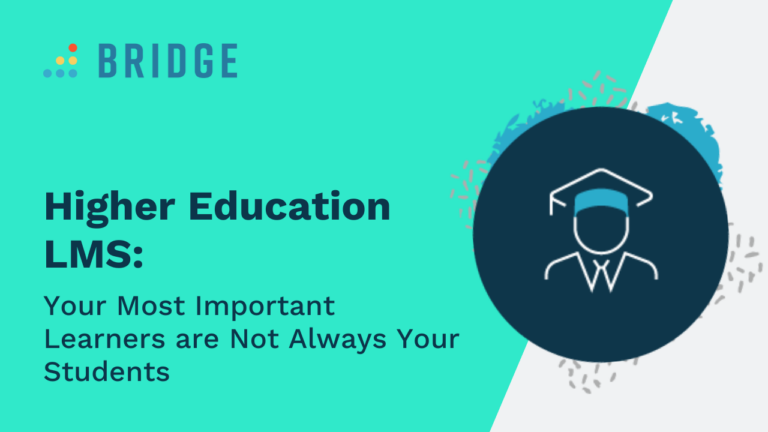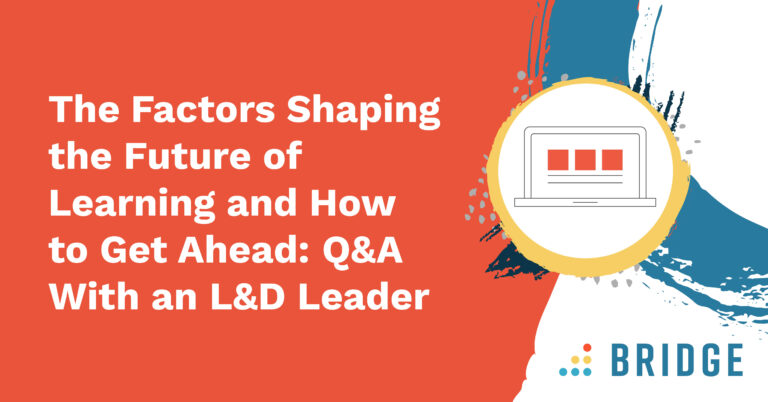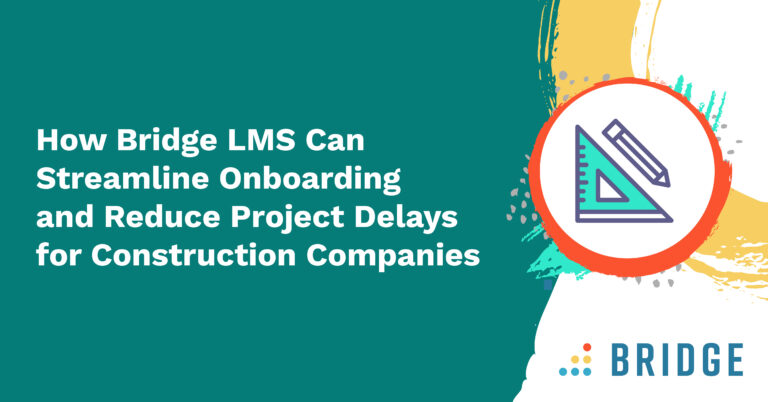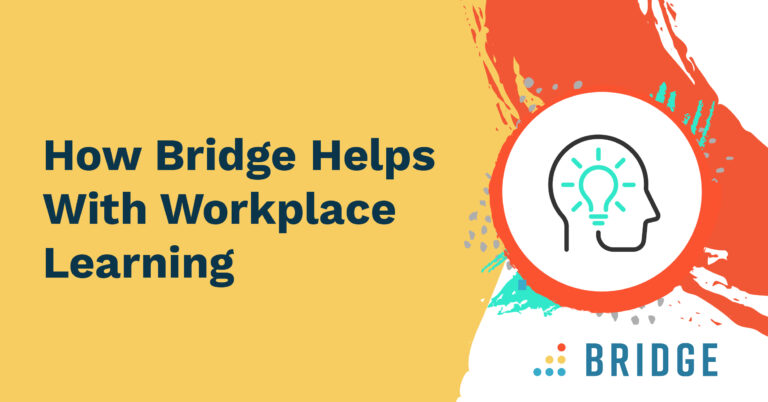There’s no industry that better understands the value of learning than higher education. Colleges and universities are constellated around the key principle of helping students grow. But how well does your institution deal with employee learning?
Here’s the thing: while many educational institutions will recognize the value of learning, they can sometimes struggle with applying it—especially once they step outside their student-teacher comfort zones. Employees need different types of learning. They’re not in it for the grades. They’re motivated by a mix of ambition, purpose, and meaning (and aspects of their learning are required for compliance reasons).
While any sector you’d care to name will benefit from a well-trained workforce, the world of education comes with its own unique set of challenges, pitfalls, and opportunities to address—so long as you know what to look for.
Pencils at the ready? Then let’s begin the lesson.
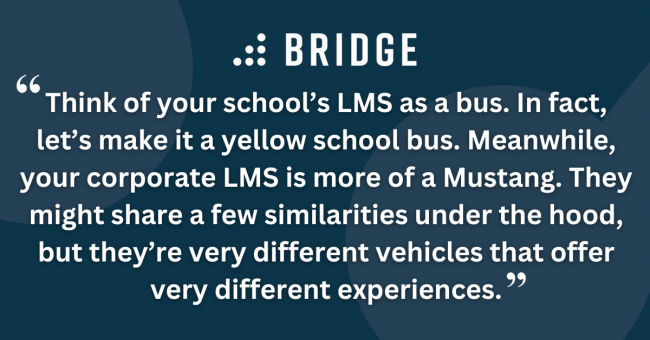
Why Your College Needs a Corporate LMS
In contrast to other sectors, an organization working in higher ed almost certainly has an LMS already. And their first instinct will be to use it.
This may feel like a smart move, and it’s certainly a cheaper one. Unfortunately, it’s also a false economy. There’s a big difference between a student-teacher LMS and a workplace LMS. Think of your institution’s LMS as a bus. In fact, let’s make it a yellow school bus. Meanwhile, your corporate LMS is more of a Mustang. They might share a few similarities under the hood, but they’re very different vehicles that offer very different experiences.
Let’s look at a practical example. In a student-focused LMS, the way you group learners and the data you collect will have certain restrictions. For example, your learners might be segmented into groups based on the classes they picked during registration. This isn’t a restriction from an educational perspective, but it won’t do the trick for your workforce. As far as employees go, you’ll want your LMS to draw from attributes like:
- Where an employee works
- Who their manager is
- Job titles and departments
- Whether they’re full-time or part-time employees
- What skills they want to develop
A student-focused LMS just won’t be set up to provide this kind of data, and doing so would involve the headache of manually manipulating how it functions—all to get an unoptimized experience. On the other hand, a corporate LMS will provide you with all the data you need for each user group. You’ll gain instant visibility over the architecture of your organization, enabling you to quickly determine whether or not Professor Smith has completed his compliance training.
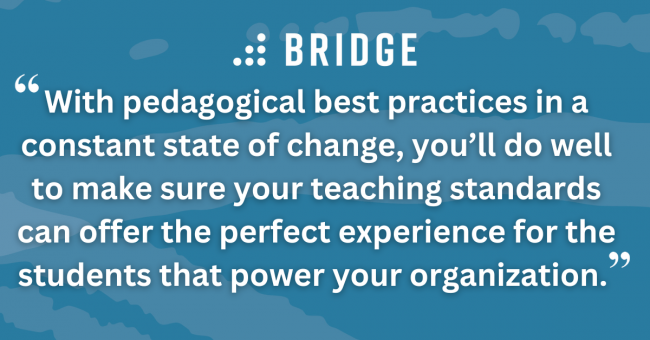
Why Corporate Training Matters for Higher Ed Workers
Ensuring the timely delivery of compliance training is just one of the reasons you’ll have to maintain the very best training standards in the higher ed sector. Let’s consider three particularly urgent and impactful motivators.
1) Higher Ed Comes With Plenty of Regulations
We all know that education is awash with compliance considerations.
For example, just look at the Family Educational Rights and Privacy Act, otherwise known by the much snappier FERPA. It’s key to protecting student privacy, and the federal government is pretty motivated to make sure higher ed organizations follow FERPA best practices. As a matter of fact, they’re so motivated that noncompliance can (in extreme circumstances) lead to a withdrawal of Department of Education funding.
The stakes are similarly high when it comes to Title IX training. Title IX allows campuses to deal with sexual discrimination and harassment effectively. Crucially, according to Jeannie Suk Gerson, a John H. Watson Professor of Law at Harvard, “the deepest impact of Title IX has been on schools’ bureaucratic and administrative structures and practices.” Getting Title IX training right is pivotal to that impact. If it’s not delivered effectively at the training stage, it can’t permeate your institution’s admin practices as well as it needs to.
These are just two examples, but they get the point across. When you’re dealing with rules of this magnitude, you’ve got all the more reason to make sure your compliance efforts don’t rely on some MacGyvered student-teacher LMS.
2) Strong Teaching Standards Need Maintaining
Who teaches the teachers?
This isn’t a riddle—the answer is you. Or, taking a wider view, it’s your L&D or HR functions. Educators will inevitably make up a large portion of your workforce, and they also have plenty of cause for good training. That’s especially true of higher ed, where you’re liable to find an increasingly diverse range of learners with an equally diverse set of learning needs to consider.
As pedagogical theories and best practices continue to evolve, you’ll do well to make sure your teaching standards can offer the perfect experience for the students that power your organization.
3) Your Workforce Comprises Diverse Professions
While educators might be a significant part of your workforce, they’re far from the only part. You’ll have a whole range of professional possibilities populating your staffing pool, and each job role will require quality training that reflects the variety of functions they serve. That includes the educators themselves, by the by—they’ll be looking to sharpen up skills like researching and grant writing. These skills are worlds away from teaching, but they’re still essential to the proper functioning of your institution.
That’s the value of an LMS that can segment users into appropriate groups. When you’re tackling an array of roles encompassing counselors, librarians, IT professionals, campus safety personnel, student services staff, and so on, you’ll want an LMS capable of easily categorizing users and allowing you to distribute the right content to the right folks.
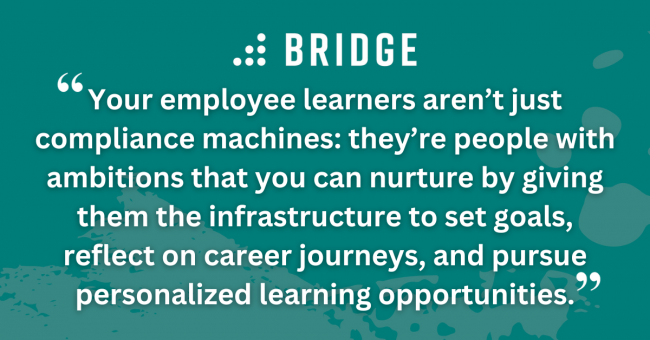
FIND OUT HOW TEMPLE UNIVERSITY TRAINED A WIDE-RANGING WORKFORCE | ‘Proactive Skill Development: Sustaining A Legacy of Learning’
Retention and Engagement Are Essential for Education Workers
Corporate training matters—but it’s not the whole story.
In fact, McKinsey reports that many universities reduce their HR functions to nothing more than a compliance and administrative role. Here’s the problem: this approach runs the risk of downplaying the huge impact that HR tech can have on attracting and retaining talent.
Attracting employees and reducing churn are always goals worth pursuing—and, in higher ed, the pursuit is getting a little more urgent. The most recent survey from The Chronicle of Higher Education found that, between 2021 and 2022, over 75% of college leaders, administrators, and hiring managers felt that the sector had become less appealing. According to a 2022 survey from the College and University Professional Association for Human Resources, over 75% of higher ed workers found the sector less appealing than they did the year before. In fact, the number of respondents who said they were looking for other opportunities in the year ahead rose by 11 points.
These developments add context to McKinsey’s observations. When you allow your HR or L&D teams to branch out from the world of compliance, and when you adopt an appropriately corporate LMS, you’ll find yourself equipped to meet the broader development needs of your employee learners.
How, you ask? Corporate LMSs aren’t just administratively powerful. They’re also great for integrating with other HR tech solutions. And, by combining your LMS with an upskilling platform or performance management system, you can offer your higher ed employees some much-needed reasons to remain (and thrive) in your institution. Your employee learners aren’t just compliance machines: they’re people with ambitions that you can nurture by giving them the tools to set goals, plan their careers, and pursue personalized learning opportunities.
The rewards, from an organizational point of view, are huge. In the eyes of the CIPD, enabling career development is a critical way to boost retention. Similarly, for one psychological study, career growth among knowledge workers (like your very own academics) improves employee engagement. In a sector that doesn’t always find it easy to stay competitive in the hunt for talent, this vital aspect of L&D can’t be taken for granted.
MORE FROM THE BLOG | ‘4 Ways to Create an L&D Experience That Truly Engages Learners’
Enhance Your Higher Education Employee Learning With Bridge
Bridge’s corporate LMS, performance management system, and upskilling platform bring together the very best aspects of employee development in a single, unified system. Schedule a demo to discover how to meet mandatory compliance needs and fulfill professional aspirations in one handy package.
